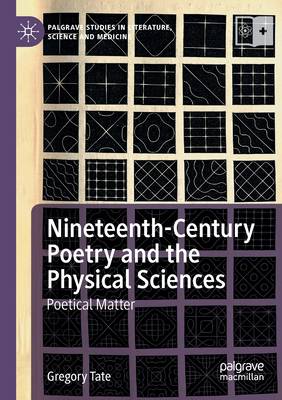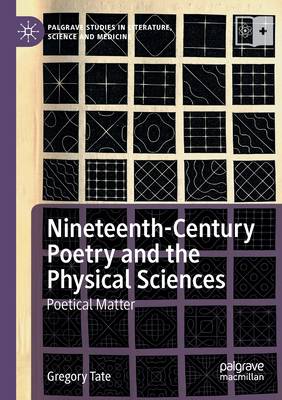
- Retrait gratuit dans votre magasin Club
- 7.000.000 titres dans notre catalogue
- Payer en toute sécurité
- Toujours un magasin près de chez vous
- Retrait gratuit dans votre magasin Club
- 7.000.0000 titres dans notre catalogue
- Payer en toute sécurité
- Toujours un magasin près de chez vous
Description
Poetical Matter examines the two-way exchange of language and methods between nineteenth-century poetry and the physical sciences. The book argues that poets such as William Wordsworth, Mathilde Blind, and Thomas Hardy identified poetry as an experimental investigation of nature's materiality. It also explores how science writers such as Humphry Davy, Mary Somerville, and John Tyndall used poetry to formulate their theories, to bestow cultural legitimacy on the emerging disciplines of chemistry and physics, and to communicate technical knowledge to non-specialist audiences. The book's chapters show how poets and science writers relied on a set of shared terms ("form," "experiment," "rhythm," "sound," "measure") and how the meaning of those terms was debated and reimagined in a range of different texts.
"A stimulating analysis of nineteenth-century poetry and physics. In this groundbreaking
study, Tate turns to sound to tease out fascinating continuities across
scientific inquiry and verse. Reflecting that 'the processes of the universe' were
themselves 'rhythmic, ' he shows that a wide range of poets and scientists were
thinking through undulatory motion as a space where the material and the immaterial
met. 'The motion of waves, ' Tate demonstrates, was 'the exemplary form in
the physical sciences.' Sound waves, light, energy, and poetic meter were each
characterized by a 'process of undulation, ' that could be understood as both a
physical and a formal property. Drawing on work in new materialism and new
formalism, Tate illuminates a nineteenth-century preoccupation with dynamic patterningthat characterizes the undulatory as (in John Herschel's words) not 'things,
but forms.'"
--Anna Henchman, Associate Professor of English at Boston University, USA
"This impressive study consolidates and considerably advances the field of physics
and poetry studies. Moving easily and authoritatively between canonical and scientist
poets, Nineteenth-Century Poetry and the Physical Sciences draws scientific
thought and poetic form into telling relation, disclosing how they were understood
variously across the nineteenth century as both comparable and competing
ways of knowing the physical world. Clearly written and beautifully structured,
Nineteenth-Century Poetry and the Physical Sciences is both scholarly and accessible,
a fascinating and indispensable contribution to its field."
--Daniel Brown, Professor of English at the University of Southampton, UK
"Essential reading for Victorianists. Tate's study of nineteenth-century poetry and
science reconfi gures debate by insisting on the equivalence of accounts of
empirical fact and speculative theory rather than their antagonism. Theundulatory rhythms of the universe and of poetry, the language of science and of
verse, come into newrelations. Tate brilliantly re-reads Coleridge, Tennyson,
Mathilde Blind and Hardy through their explorations of matter and ontological
reality. He also addresses contemporary theory from Latour to Jane Bennett."
-- Isobel Armstrong, Emeritus Professor of English at Birkbeck, University of London, UK
Spécifications
Parties prenantes
- Auteur(s) :
- Editeur:
Contenu
- Nombre de pages :
- 271
- Langue:
- Anglais
- Collection :
Caractéristiques
- EAN:
- 9783030314439
- Date de parution :
- 26-08-21
- Format:
- Livre broché
- Format numérique:
- Trade paperback (VS)
- Dimensions :
- 148 mm x 210 mm
- Poids :
- 340 g

Les avis
Nous publions uniquement les avis qui respectent les conditions requises. Consultez nos conditions pour les avis.






